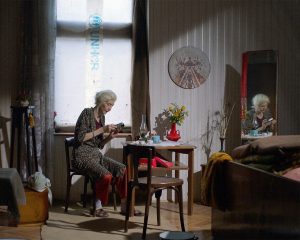SEVAP/MITZVAH is a riveting, edge-of-the-seat gem of extraordinary finesse and storytelling.
The plot: A Muslim woman, Zejneba Hardaga (played by Helena Vukovic) convinces her family to risk their lives to save the woman’s Jewish friend, Rifka Kabiljo, played by Magdalena Tadic, and her family in Bosnia from genocidal Nazis and their depraved Ustatše allies during World War II. Many years later, Rifka returns the favor by helping to save Zejneba from the genocidal savagery of the 1990s Croatian Bosnian War.
[Note: Sevap, roughly translated in Arabic, and Mitzvah, roughly translated in Hebrew, pretty much mean the same thing: A good deed.]
SEVAP/MITZVAH: A fabulous composition of writing and plot, directing and editing, cinematography and acting, and resulting in remarkable verisimilitude that can make audiences feel like flies-on-the-wall: Zejneba helping friends negotiate Nazi and Ustatše street patrols and anti-Jewish blockades by relying on her brains and guile; intense Hardaga family squabbling early on about the risks of helping the Jewish family; heart-touching moments later on when the Haragas’ main patriarch, reflecting on certain Muslim customs, allows women not to wear hijabs, making it easier to welcome the Kabiljos as members of their family.
Director/Writer Sabina Varjraca
Starring: Helena Vukovic, Adnan Haskovic, Rijad Gvozden, Muhamed Hadzovic, Snezana Vidovic, Frano Maskovic, Sanela Krsmanovic and Emina Muftic – more IMDb info.
Short films have become popular because they can provide a cost-effective learning experience for filmmakers and because of increasing audience diversity – though SEVAP/MITZVAH has the look and feel of a feature. That train of thought has this writer-reviewer imagining Director/Writer Sabina Varjraca’s 17-minute virtuoso SEVAP/MITZVAH is in the works to become a SEVAP/MITZVAH feature film.
Most of the 17 minutes of the short was about the escape from Bosnia, with the Jewish family eventually making its way to Israel. In feature-length mode, more can be told and with more depth. This, of course, is just delightful speculation by a writer-reviewer in awe of an incredible film.
The title reflects a belief of the universality of the heart of the human soul, that it has the potential to evolve transcendentally beyond the darkest of the dark side of human nature reflected in all the pogroms, genocides and wars throughout the ages – at least that’s the speculation of this reviewer-writer.
The two women friends and their families come together to protect each other. It’s a period piece based on a true story. The families, when so many of their neighbors succumbed, refused to cave into fear and dared to stare down death and suffering rather than surrender too obsequious, sycophantic betrayal during ethnic cleansing and genocidal periods in Bosnia.
Director/Writer Sabina Vajraca’s has as a phenomenal story-telling prowess. She was born in Bosnia and Herzegovina and immigrated to the American in 1994 as a war refugee from the 1990s Croatian Bosnian War. Her critically acclaimed feature documentary BACK TO BOSNIA, according to publicity, is featured in the top 100 of the greatest films directed by women by the BBC. It’s currently streaming on multiple platforms, including Amazon. Most recently she co-directed a Warner Bros./USC feature period drama VOODOO MACBETH.
Producer Kerim Masovic started his filmmaking journey over a decade ago. He founded Kontraplan in 2019, with two frequent collaborators, Neven Samardzic and Sasa Pesevski.
SEVAP/MITZVAH screened October 16 at Hollyshorts Film Fest
Gregg W. Morris can be reached at gregghc@comcast.net, profgreggwmorris@gmail.com



